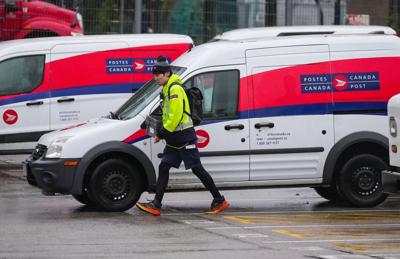Negotiations between Canada Post and its union remained at an impasse Monday as the national overtime ban for union members continues.
The Crown corporation experienced a 50 per cent drop in delivered parcel volume by the end of last week, the company told the Star Monday, as customers hesitate to make orders amid worries of a wider work stoppage.
Meanwhile, an ongoing overtime ban from union members may add to delays and service disruptions, the postal service said.
Canada Post spokesperson Phil Legault said the corporation received the union’s response to its offers on Sunday and is currently reviewing them in detail.
“After almost two years of negotiations, a lengthy national strike and the release of the final report of the Industrial Inquiry Commission, it’s now time for urgency and we will respond in short order,” Legault said in an email. “The impact of the ongoing uncertainty on our business is significant, but the impact on the Canadian economy is greater.”
The Canadian Union of Postal Workers (CUPW) said Sunday it was informed
In a bulletin, the union said Canada Post’s offers last Wednesday — including a 13 per cent wage hike over four years and the creation of new, part-time carrier positions — .
Canada Post said as it faces “significant financial and operational challenges.”
The corporation has recorded more than $3 billion in losses since 2018 and said it will post another “significant loss” for 2024.
As talks continue, CUPW issued an overtime ban that, beginning last Friday, will see all union members refuse to work more than eight hours a day and more than 40 hours a week. Compared to a full strike, CUPW said the ban would minimize service disruptions while keeping pressure on the corporation.
“Customers may experience delays as a consequence of the ongoing overtime ban,” Legault told the Star. “Further escalation could significantly impact our employees, small businesses, and the millions of Canadians who depend on the postal system, while also worsening the company’s already serious financial situation.”
Rafael Gomez, a professor of employment relations at the University of Toronto, predicts the overtime ban will have relatively little impact on services.Â
“It’s not peak mail and parcel delivery season ... this isn’t the period when they’re going to need (overtime) the most,” he told the Star. Because it will likely lead to minimal disruptions, Gomez felt the ban won’t be very effective at bringing Canada Post to the bargaining table.
CUPW is facing other hurdles in its negotiations. Earlier this month, a Federal Industrial Inquiry Commission established by Ottawa found Canada Post to be effectively “bankrupt” — a result that may sway public sentiment in favour of the Crown corporation, Gomez said.
Meanwhile, the report’s recommended structural changes, which include replacing some post office locations with franchises, could lead to a shrinking of union membership, he said.
“I think membership might have to recognize that this might be the best deal on offer given the changes that can come after.”























To join the conversation set a first and last name in your user profile.
Sign in or register for free to join the Conversation